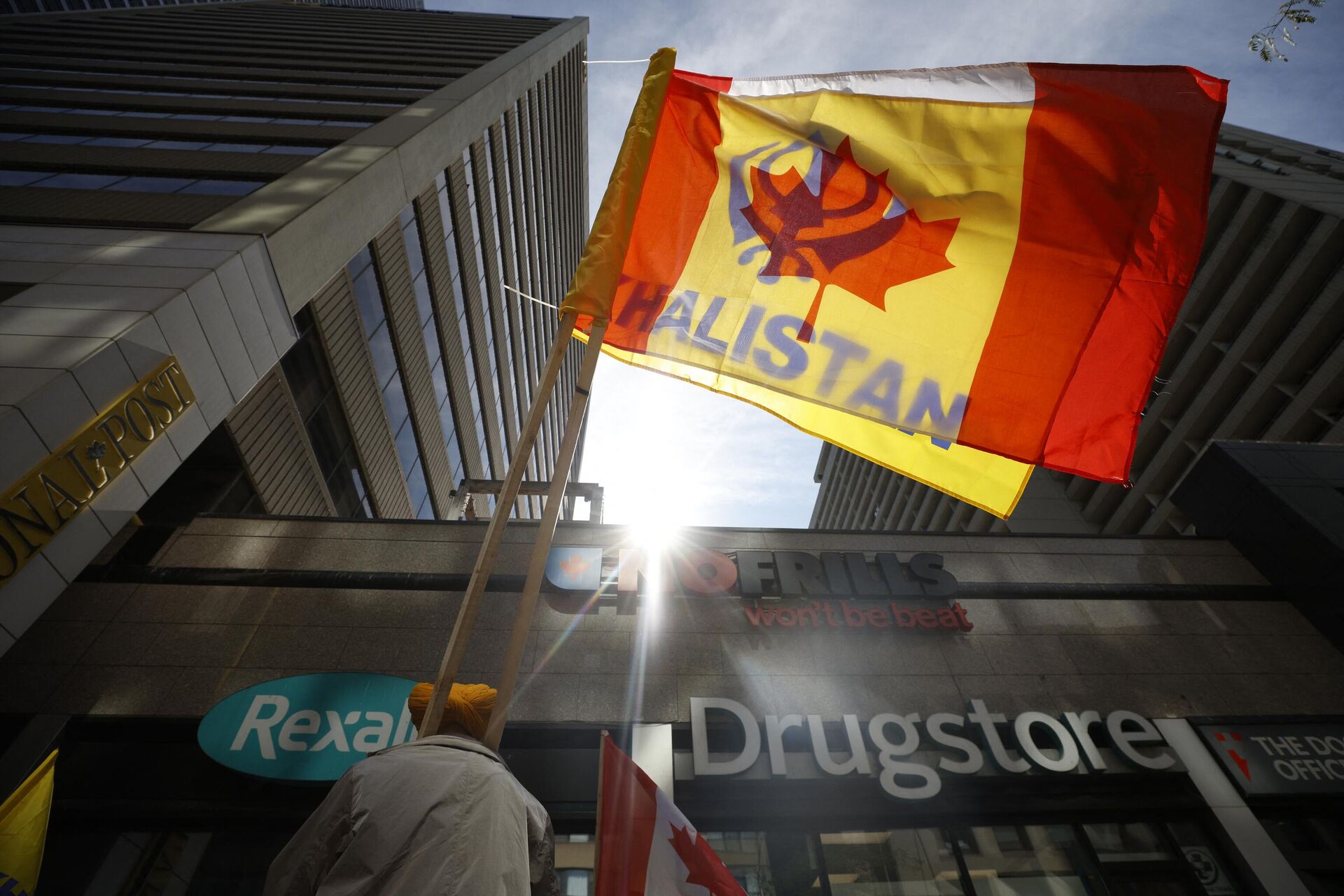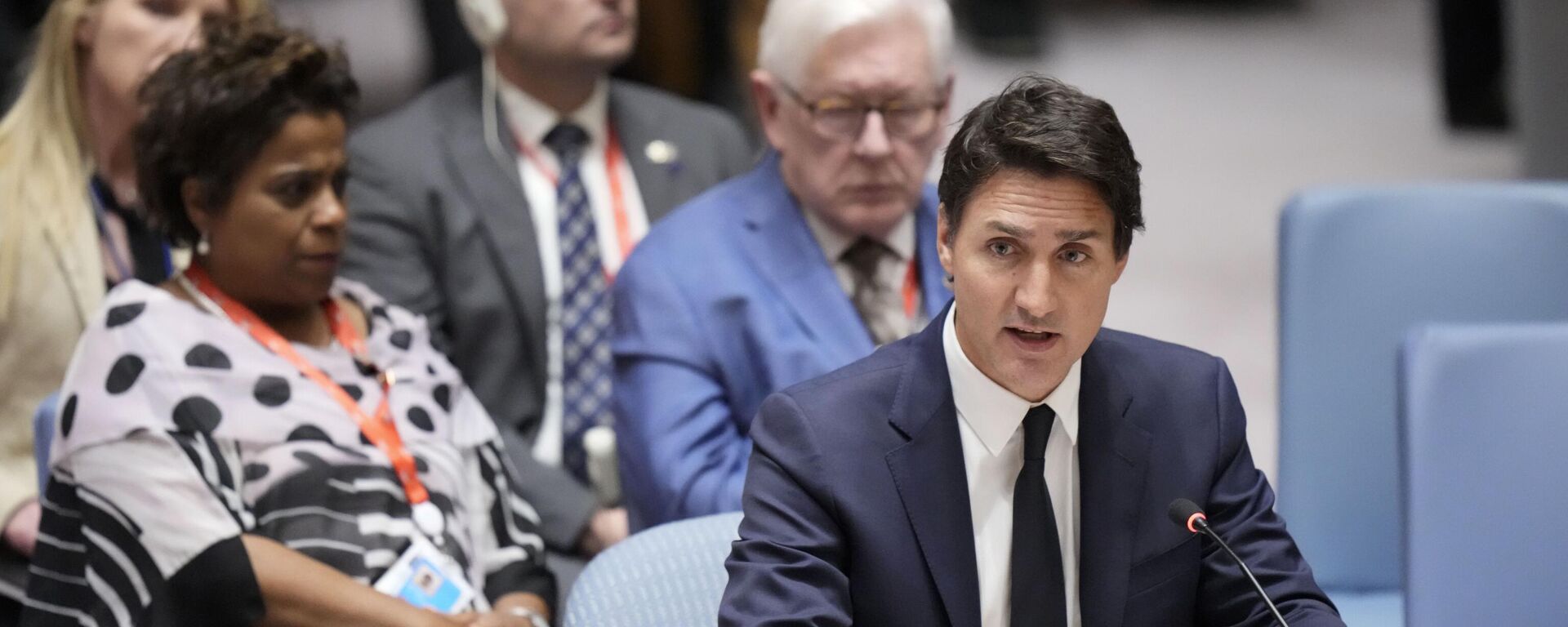https://sputniknews.in/20241022/decoding-jaishankars-words-on-west-uncomfortable-with-world-changes-8308873.html
Decoding Jaishankar's Words on West Uncomfortable With World Changes
Decoding Jaishankar's Words on West Uncomfortable With World Changes
Sputnik India
Jaishankar's comments on the shifting dynamics of a multipolar world reveal that the West is increasingly uncomfortable with the rise of non-Western countries and forums like BRICS, according to experts.
2024-10-22T22:21+0530
2024-10-22T22:21+0530
2024-10-23T11:45+0530
sputnik opinion
government of india
ministry of external affairs (mea)
s. jaishankar
brics
brics summit 2024
kazan brics summit
china
collective west
western sanctions
https://cdn1.img.sputniknews.in/img/07e8/04/1d/7244884_0:160:3072:1888_1920x0_80_0_0_3459756a742018f3b3fb413772ef72a5.jpg
The world has become more multipolar with non-Western countries increasing their influence, India's foreign minister has said.Changes in the last 25 years have led to evolving dynamics that the West is finding challenging to adapt to, S Jaishankar told the 2024 NDTV World Summit.Jaishankar noted that as the world's natural diversity emerges, with more countries — especially India and China — asserting their perspectives, opinions and influence, there will inevitably be contestation, friction, and disagreements.Jaishankar argued that the shifting dynamics of a multipolar world reveal that the West is increasingly uncomfortable with the rise of non-Western countries and the legitimacy of forums like BRICS."This discomfort seems rooted in a colonial mindset and a sense of racial superiority, making it difficult for them to accept the realities of countries like India, Russia, and China rising as influential powers," Dr Suvrokamal Dutta, acclaimed International Conservative Political Economic and Foreign Policy Expert, told Sputnik India.Jaishankar also pointed out the double standard that while Canada has launched a criminal probe into India’s high commissioner, it allows its diplomats to freely gather intelligence on India's military and police, profiling individuals without restrictions — contrasting sharply with the limitations placed on Indian diplomats in Canada.The West struggles to acknowledge the existence of effective non-Western forums such as BRICS, the Shanghai Cooperation Organisation and ASEAN, which challenge their historical hegemony, Dutta noted.'India Can Use BRICS to Tackle Khalistani Extremism'The pundit argued that India has a clear opportunity to utilize the BRICS platform to address issues like Khalistani Sikh seperatism while exposing the double standards of Western nations regarding terrorism.Dutta stressed that many individuals identified as terrorists by the Indian government and listed by Interpol find refuge and support in Western countries, particularly the US and Canada, highlighting the double standards and duplicity in how those nations deal with Khalistan-related groups."This raises critical questions for the US and Canada about what constitutes a 'good citizen,' and whether their definitions of law-abiding individuals are truly valid," he added.He charged that calling separatist leaders 'law-abiding' raises critical questions about the Western definitions of terrorism and militancy and even whether figures like Saddam Hussein, Muammar Gaddafi or Osama Bin Laden should also be considered terrorists.Bin Laden and the Taliban* are not fundamentally different from those promoting similar agendas, like Khalistani separatist leaders Hardeep Singh Nijjar and Gurpatwant Singh Pannun, and urged the Biden and Trudeau administrations to clarify their stance, Dutta asserted as this undermines their credibility.Western Nations Fund Anti-Indian ActivitiesIn terms of intelligence, India remains resolute against any anti-Indian activities, former Research and Analysis Wing officer RK Yadav told Sputnik India.He added that figures like Lashkar-e-Taiba founder Hafiz Saeed are currently in hiding, showing the threat against them, noting that "both Canada and the US are providing financial support to anti-Indian factions, undermining Indian interests."The former Intelligence officer said that while there was ongoing speculation about the US stance, India’s diplomatic capabilities are strong enough to handle these challenges.The Canadian government’s double standards over anti-Indian activities are clear, particularly with the Sikh voter base influencing Trudeau's political strategy, Yadav pointed out.He noted that Russia expressed support for India at the last SCO meeting, although no members of the security cooperation group were expected to raise concerns about the Khalistani issue.Sodhi said the Khalistani movement was largely suppressed decades ago. But in recent years it has seen a resurgence in Western countries which have failed to take action against Khalistani militants operating on their territories.This negligence, he said, has led to troubling consequences such as the recent bombing near a school in Delhi — allegedly orchestrated by Khalistani separatists.The military pundit stressed that decades of US unipolarity is coming to an end.Several countries are now emerging as equals to the US, creating a landscape with other significant powers.As nations increasingly prioritise their own security needs and interests, he warned the US must recognize that its days of hegemony are over and that it can no longer act unilaterally.*under UN sanctions
https://sputniknews.in/20241018/sick-of-trudeau-growing-discontent-across-canada-8285134.html
china
us
canada
Sputnik India
feedback.hindi@sputniknews.com
+74956456601
MIA „Rossiya Segodnya“
2024
Swapna Nair
https://cdn1.img.sputniknews.in/img/07e7/09/12/4320104_0:0:681:681_100x100_80_0_0_ca8a7d4d582609272840ffdd1cde7278.jpg
Swapna Nair
https://cdn1.img.sputniknews.in/img/07e7/09/12/4320104_0:0:681:681_100x100_80_0_0_ca8a7d4d582609272840ffdd1cde7278.jpg
News
en_IN
Sputnik India
feedback.hindi@sputniknews.com
+74956456601
MIA „Rossiya Segodnya“
Sputnik India
feedback.hindi@sputniknews.com
+74956456601
MIA „Rossiya Segodnya“
Swapna Nair
https://cdn1.img.sputniknews.in/img/07e7/09/12/4320104_0:0:681:681_100x100_80_0_0_ca8a7d4d582609272840ffdd1cde7278.jpg
india, canada, us, terrorism, khalistani separatism
india, canada, us, terrorism, khalistani separatism
Decoding Jaishankar's Words on West Uncomfortable With World Changes
22:21 22.10.2024 (Updated: 11:45 23.10.2024) Jaishankar's comments on the shifting dynamics of a multipolar world reveal that the West is increasingly uncomfortable with the rise of non-Western countries and forums like BRICS, according to experts.
The world has become more multipolar with non-Western countries increasing their influence, India's foreign minister has said.
Changes in the last 25 years have led to evolving dynamics that the
West is finding challenging to adapt to, S Jaishankar told the 2024 NDTV World Summit.
Jaishankar noted that as the world's natural diversity emerges, with more countries — especially India and China — asserting their perspectives, opinions and influence, there will inevitably be contestation, friction, and disagreements.
Jaishankar argued that the shifting dynamics of a multipolar world reveal that the West is increasingly uncomfortable with the rise of non-Western countries and the legitimacy of forums like BRICS.
"This discomfort seems rooted in a
colonial mindset and a sense of racial superiority, making it difficult for them to accept the realities of countries like India, Russia, and China rising as influential powers," Dr
Suvrokamal Dutta, acclaimed International Conservative Political Economic and Foreign Policy Expert, told
Sputnik India.
Jaishankar also pointed out the double standard that while Canada has launched a criminal probe into India’s high commissioner, it allows its diplomats to freely gather intelligence on India's military and police, profiling individuals without restrictions — contrasting sharply with the limitations placed on Indian diplomats in Canada.
"India has consistently supported a multipolar world as a cornerstone of its foreign policy since gaining independence, and this stance remains unchanged," Dutta explained. "Any attempt by the United States and Western nations to coerce India into becoming their ally through pressure tactics is misguided and will not succeed."
The West struggles to acknowledge the existence of effective non-Western forums such as BRICS, the Shanghai Cooperation Organisation and ASEAN, which challenge their historical hegemony, Dutta noted.
'India Can Use BRICS to Tackle Khalistani Extremism'
The pundit argued that India has a clear opportunity to utilize the BRICS platform to address issues like Khalistani Sikh seperatism while exposing the double standards of Western nations regarding terrorism.
"The recent bomb blasts near the CRPF school in Delhi and 200 bomb scares on various flights to and from India are a serious concern for the Indian government, as these incident are allegedly linked to the Khalistani Liberation Force, indicating a coordinated effort by external groups," Dutta said.
Dutta stressed that many individuals identified as terrorists by the Indian government and listed by Interpol find refuge and support in Western countries, particularly the US and Canada, highlighting the double standards and duplicity in how those nations deal with Khalistan-related groups.
"I am deeply concerned by Justin Trudeau's remarks about Canadian citizens allegedly harmed by Indian agents, especially given the many social media images of individuals like Pannun and Nijjar posing with weapons such as AK-47s and rocket launchers," Dutta said.
"This raises critical questions for the US and Canada about what constitutes a 'good citizen,' and whether their definitions of law-abiding individuals are truly valid," he added.
He charged that calling separatist leaders 'law-abiding' raises critical questions about the Western definitions of terrorism and militancy and even whether figures like Saddam Hussein, Muammar Gaddafi or Osama Bin Laden should also be considered terrorists.
Bin Laden and the Taliban* are not fundamentally different from those promoting similar agendas, like Khalistani separatist leaders Hardeep Singh Nijjar and Gurpatwant Singh Pannun, and urged the Biden and Trudeau administrations to clarify their stance, Dutta asserted as this undermines their credibility.
Western Nations Fund Anti-Indian Activities
In terms of intelligence, India remains resolute against any anti-Indian activities, former Research and Analysis Wing officer RK Yadav told Sputnik India.
He added that figures like Lashkar-e-Taiba founder Hafiz Saeed are currently in hiding, showing the threat against them, noting that "both Canada and the US are providing financial support to anti-Indian factions, undermining Indian interests."
The former Intelligence officer said that while there was ongoing speculation about the US stance, India’s diplomatic capabilities are strong enough to handle these challenges.
The Canadian government’s
double standards over anti-Indian activities are clear, particularly with the Sikh voter base influencing Trudeau's political strategy, Yadav pointed out.
He noted that Russia expressed support for India at the last SCO meeting, although no members of the security cooperation group were expected to raise concerns about the Khalistani issue.
"Western nations, including the US and Canada, have allowed anti-Indian activities on their soil, which undermines their claims of being true allies, since a genuine friend would not permit such actions against another country," retired lieutenant colonel and defence expert JS Sodhi told Sputnik India.
Sodhi said the Khalistani movement was largely suppressed decades ago. But in recent years it has seen a resurgence in Western countries which have failed to take action against Khalistani militants operating on their territories.
This negligence, he said, has led to troubling consequences such as the recent bombing near a school in Delhi — allegedly orchestrated by Khalistani separatists.
International forums like the BRICS and SCO are crucial as they comprise some of the world's wealthiest and most influential nations, enabling India to address issues like Khalistani and other extremists groups that threaten its sovereignty, Sodhi said.
The military pundit stressed that decades of US unipolarity is coming to an end.
Several countries are now emerging as equals to the US, creating a landscape with other significant powers.
As nations increasingly prioritise their own security needs and interests, he warned the US must recognize that its
days of hegemony are over and that it can no longer act unilaterally.




